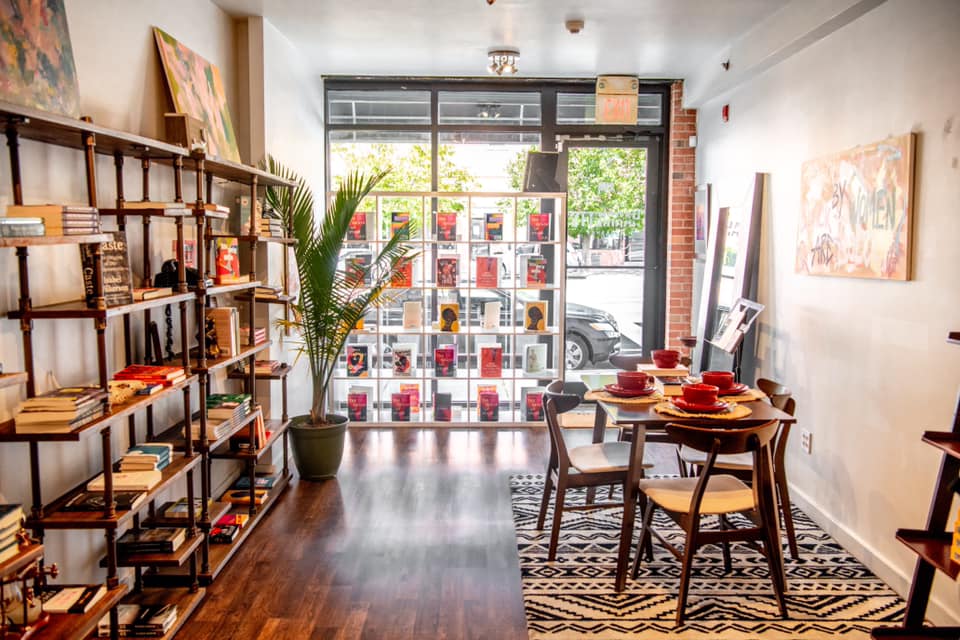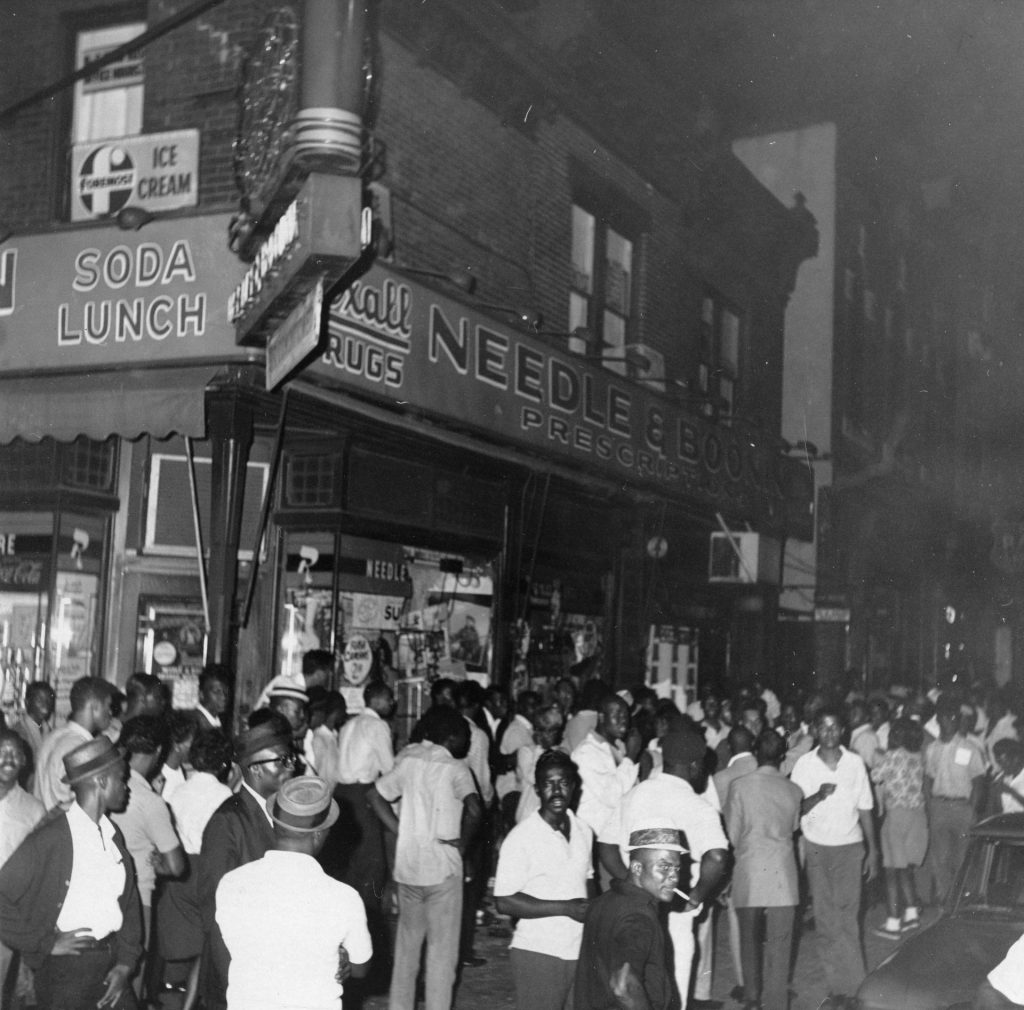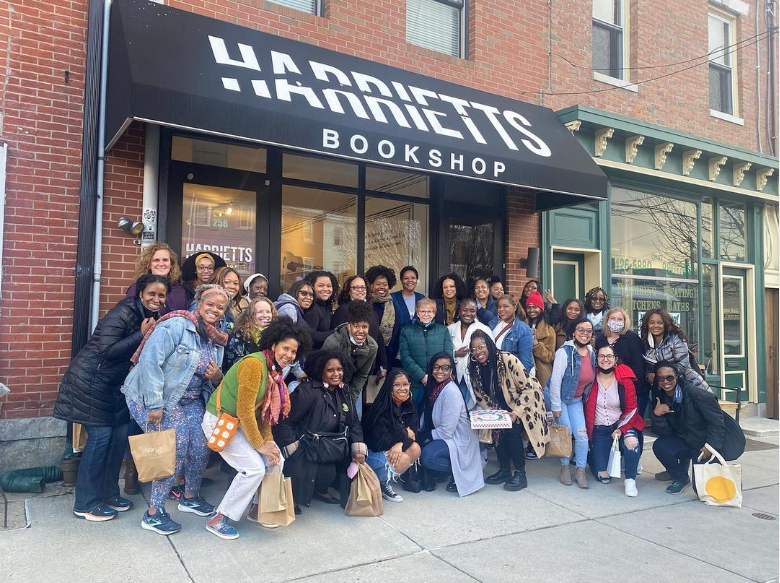Harriett’s Bookshop – Home to History, Activism, and Literature
Harriett’s Bookshop – Home to History, Activism, and Literature
While walking down the historic streets of the Fishtown neighborhood of Philadelphia, you may notice the age of the town behind new paints and plaster, the indents where bullets still live within the ancient brick townhouses. Abandoned pickets lay scattered within Fishtown’s alleyways, they almost seem like cracks in an otherwise quaint and beautiful little neighborhood. A sudden gust of wind tinged with salt and scales has you looking down at a sidewalk that has led countless people to where they wanted to be, and now you happen to find yourself looking down at concrete steps leading into a bookshop. The black awning shields you from the sun but blankets you in warm shade, you open the door and hear “welcome to Harriett’s,” as the salt, scales, and alleyway unease are replaced by the light smell of frankincense and book paper. You feel comfortable, relaxed, like you’ve found yourself in some sort of paradise.
“The bookstore feels like a gallery, where the books, mostly iconic and newer titles by Black women-identifying authors—Toni Morrison, Zora Neale Hurston, Alice Walker, bell hooks—are the art.”
Lauren McCutcheon (The Philadelphia Citizen)

That’s exactly the kind of feeling Jeannine Cook, the owner of Harriett’s Bookshop, wants her customers to feel. Harriett’s, named after Harriet Tubman, strives to be a place for minorities to come to and feel at home, feel comfortable, feel safe. Cook has always been a big community-oriented person and takes great pleasure in teaching. After graduating from the University of the Arts in 2004, she began teaching creative writing twice a week at the John Street Community Center. On other days, she would stand at the corner of Broad Street and Cecil B. Moore Avenue selling books and incense. Cook would go on to teach creative writing at Point Breeze Performing Arts Center, District 1199C, and Youth Build. She’d teach at Yes Philly with teens who’ve dropped out and got caught up in the justice system and through American Friends Service Committee, she worked with youths from 10 different countries developing a racism, colonialism, and imperialism centered course curriculum. Even after opening Harriett’s, Cook says “Every time I think I’ve left the classroom. I end up right back in the classroom (CBS Philadelphia, 2020).” She does this through her activism, through giving back to the community, for speaking out when no one else is strong enough to. She does things with the intention of making an impact.
Cook has faced many trials and tribulations opening her bookshop and continues to face challenges. The first lease she ever signed for Harriett’s rented her a vacant store space that would end up burning down within that same year. This didn’t deter her, of course, as she signed the current lease in 2019 and had her grand opening on February 1st, 2020. Ah yes, the dreaded 2020. Merely six weeks after opening, all business were forced to shut down when a quarantine was mandated in March of 2020 due to the rapid spread of Covid-19. While many businesses had gone out of business, Harriett’s was still hanging on. Cook took the bookshop online, sold physical copies from a pop-up sidewalk bookshop, and collaborated with Dr. Gina South, an ER doctor at Pennsylvania Hospital, to create “Essentials for Essentials.” Although Cook was surviving through the pandemic, the natives of Fishtown didn’t make it any easier for her.

Fishtown today is considered one of the hippest neighborhoods in Philly; its historical scars hidden away behind its new persona, but that’s just the thing with scars, cracks, and history, they run deep. We see that in how much Cook has had to fight to open and sustain her business as a female black business owner. Although Fishtown has a more creative population than they once had, it is still one of the most nondiverse parts of Philadelphia having a predominantly white population. In a video titled “Stories in Place” on Harriett’s Bookshop’s website, Jeannine said, “When I first came to Philly, what people said a lot was that Fishtown has a really sorted past and a really sorted present (Momar 5:08).” The unbalanced nature of Fishtown is often pointed out to Cook in the form of violent and racist emails, protests of white men wielding baseball bats, and white people mimicking Floyd’s murder in the streets. This was especially prominent after George Floyd’s lynching, in May 2020, which sparked Black Lives Matter protests from all over the country. This isn’t new for Fishtown either; historically Philadelphia was known to harbor many violent race riots, one of the more famous being the Columbia Avenue Riot of 1964.
Stories in Place: Harriett’s Bookshop from Raishad Momar titled “Sisters of the Soil” (Momar, 2023).
Being a primarily white town isn’t what’s causing inequality in Fishtown, but the fact that so many of these white people are older and set in their ways. Cook recalls an event not long after the white ‘pro cops’ protest with baseball bats, when she was walking down the street and came upon white protestors silently kneeling for nine minutes, mimicking the same amount of time Derek Chauvin kneeled on George Floyd’s neck, protesting in favor of the police. Just as the ‘pro cops’ protest was just around the corner from Harriett’s, so too was this. Like any sane person, Cook found this display jarring as she watched countless strangers reenact Floyd’s lynching.
“This is the thing that happens in this country over and over again, where things lose their essence, lose their direction. In that very moment, silence is violence.”
Jeannine Cook (McCutcheon, 2022)
When Cook and several other black business owners received racist and violent emails, threatening to burn, rape workers and mothers, and remind them that BIPOC lives are in constant danger, Cook organized her own protest, a Sisterhood Sit-In. With the support of her customers and social media presence, on March 12, 2022, her and hundreds of others walked from Fabrika to Harriett’s in an umbrella procession. The umbrellas obscured the faces of protestors, making it difficult to guess ages, so-called races, and so-called sexual orientations. Cook only had three days to organize the protest, but in the end, it went exactly as she was hoping.

Cook’s social media presence grabbed the attention of more people than she was expecting, jumping from only 3k to 30k followers in only a couple weeks. People admire what she stands for, that she was risking her life and safety to pass out books like Building a Movement to End the New Jim Crow: An Organizing Guide by Daniel Hunter and Emergent Strategy: Shaping Change, Changing Worlds by Adrienne Maree Brown. Cook was nearly shot herself by a police sniper in Kentucky but continued from Minneapolis to City Hall in Philly and back in front of her shop. Cook’s dedication to standing up against inequality, racism, sexism, and more, garnered her support from some well-known faces. On November 9, 2021, only a couple weeks after Harriett’s post-quarantine reopening party, Harriett’s hosted the launch party for Will Smith’s new memoir Will. Harriett’s also grabbed the attention of some of Cook’s literary heroes; with Nikole Hannah-Jones visiting Harriett’s in-store art display paying tribute to her book The 1619 Project, and Alice Walker attending a hybrid event hosted by Harriett’s celebrating the 40th anniversary of The Color Purple.
Harriett’s Bookshop would be what it is if not for how Cook is. From all the books being written by black female authors to the charming events, Harriett’s brings people together. An article from the Philadelphia Citizen, they quote Cook saying, “People start calling the store more than a store, saying it’s a sanctuary, a hangout, a safe space, an art gallery, a monument (McCutcheon, 2022).” This is exactly it. Harriett’s is a sanctuary and safe space for minorities within an oppressive neighborhood, that have no other place they can go where they feel safe. It is a monument dedicated to the fight for equality, showcasing what an equal world could look like. Harriett’s is a symbol of hope and of home, many can agree. It is a place of learning, filled with books that make you feel seen and topics which make you feel there’s hope or that good change is possible. Harriett’s sparks peaceful protest for what is right, it’s what makes the bookshop feel like a home rather than a place of business. “The purpose behind her store was “not a matter of sales. It’s not a questioning of bookselling… It’s the raising of consciousness (Davis, p 37).”
Timeline of Harriett’s Bookshop in green above and important national events in brown below (McCann, 2023).
Sources
Media
Cook, Jeannine. “Harrietts_bookshop .” Instagram, 2019, www.instagram.com/harrietts_bookshop/.
Elkins, Alex. “Columbia Avenue Riot.” Encyclopedia of Greater Philadelphia, 15 Mar. 2022, philadelphiaencyclopedia.org/essays/columbia-avenue-riot/.
Fishtown District. “Harriett’s Bookshop.” Fishtown District, 2023, fishtowndistrict.com/business/harrietts-bookshop/.
Momar, Raishad. “Stories in Place: Harriett’s Bookshop.” Vimeo, 8 Oct. 2023, vimeo.com/507621976.
Websites
CBS Philadelphia. “Harriett’s Bookshop in Fishtown Thriving during Pandemic Due to Unique Mission.” CBS News, CBS Interactive, 25 Aug. 2020, www.cbsnews.com/philadelphia/news/harrietts-bookshop-in-fishtown-thriving-during-pandemic-due-to-unique-mission/.
Goulet, Emily. “Fishtown: An Oral History (so Far).” Philadelphia Magazine, 25 Nov. 2019, www.phillymag.com/news/fishtown-oral-history-philadelphia/.
Harriett’s. “Harriett’s.” Our Sister Bookshops, 2023, www.oursisterbookshops.com/harrietts.
Harriett’s Bookshop Online. “Harriett’s Bookshop Bookshop.” Bookshop, 2023, bookshop.org/shop/harriettsbookshop.
McCutcheon, Lauren. “How Black Bibliophile Jeannine Cook Became the Voice of Philadelphia.” The Philadelphia Citizen, 14 Nov. 2022, thephiladelphiacitizen.org/jeannine-cook-philly/.
McShane, Julianne. “Why a Bookstore Owner Is Working to Make Harriet Tubman Day a Reality.” NBCNews.Com, NBCUniversal News Group, 29 Apr. 2022, www.nbcnews.com/news/us-news/bookstore-owner-working-make-harriet-tubman-day-reality-rcna26333.
Rebolini, Arianna. “For Harriett’s Bookshop Owner Jeannine Cook, at the Root of Everything …” Oprah Daily, 28 Feb. 2022, www.oprahdaily.com/entertainment/books/a39186848/jeannine-cook-harrietts-bookshop/.
Wilson, Jennifer. “Q&A: Cook’s Activism at Philly Bookshop.” Poets & Writers, 11 Feb. 2022, www.pw.org/content/qa_cooks_activism_at_philly_bookshop.
Text
“Liberation Through Literacy.” From Head Shops to Whole Foods: The Rise and Fall of Activist Entrepreneurs, by Joshua Clark Davis, Columbia University Press, 2020, pp. 35–82.
Miller, Laura J. Reluctant Capitalists: Bookselling and the Culture of Consumption. Chicago: University of Chicago Press, 2006.
Timeline
McCann, Bedelya. “Harriett’s Bookshop Timeline.” Harriett’s Bookshop Timeline – Timeline, 2023, time.graphics/line/841980.

0 Comments